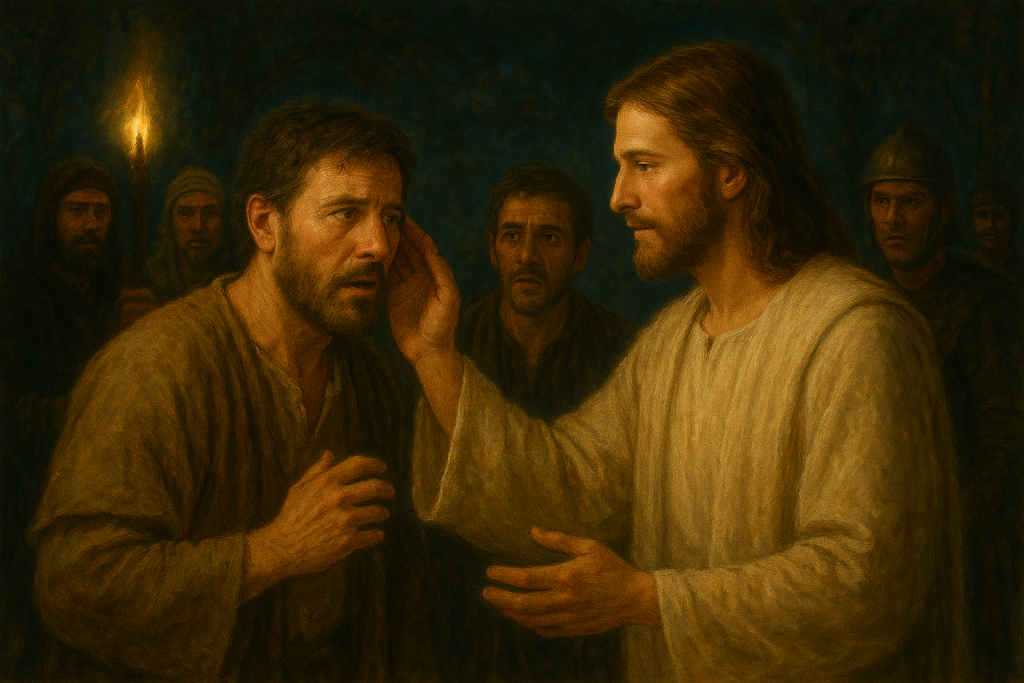
This is a story – a might have been
John 18:10
When the torches came snaking through the Kidron Valley, Malchus walked near the front. His name in Hebrew circles probably sounded like Melekh or Melechos. It carried the sense of servant of a king, a fitting name for someone tied to the high priest’s household. He had served Caiaphas long enough to know when tension was in the air, and this night was thick with it. The wind carried the smell of olive leaves and damp earth. People don’t think about that part: it was cold, dark, and everyone was tired.
He wasn’t a soldier. He didn’t wake up that morning saying, I think I’ll march into a garden and arrest a rabbi. He was doing what he had always done, staying close to his master’s circle. Still, the rumors about Yeshua (Jesus) had reached even the servants: Galilean teacher, miracles, arguments with the authorities, people hanging on His every word. Malchus had seen religious arguments before. They came and went. But this one set the entire priesthood on edge.
Judas walked ahead, shoulders tight. Malchus watched him often glance over his shoulder, as if expecting something to leap from the dark. Even he could tell the man was unraveling. The soldiers whispered about betrayal money. Malchus didn’t like the way any of it felt.
Then they saw Him.
Jesus wasn’t hiding. He stood right there where the olive trees opened into a small clearing. Malchus would remember that sight for the rest of his life. Jesus stepped forward before anyone could demand anything, and used a simple phrase in Greek that cut like lightning: Ego eimi. I am. When He said it, many of the men around Malchus fell onto the ground backward. That strange moment seared itself into his mind. He couldn’t have explained it, but he felt something like a surge of presence, like standing too close to the truth.
Then everything exploded.
Peter, the fisherman who was always the first to talk and the last to think, rushed forward with a blade. That part wasn’t elegant. A fisherman swinging a sword isn’t a warrior; it’s someone desperate. And Malchus, who had stepped forward to steady one of the lanterns, suddenly felt a streak of fire across the side of his head. He didn’t hear the slice. He felt warmth running down the side of his face, and a surge of panic.
The world tilted. He clutched where his ear should have been. The pain was sharp and frightening. The soldiers shouted. Some grabbed Peter. Others raised shields. The whole line was ready to strike.
But Jesus moved faster.
He didn’t recoil. He didn’t panic. He stepped straight toward the man who had come to arrest Him. That’s the part that always stands out in the Greek accounts, especially the writers who record the event with precision. The verbs point to immediate, deliberate motion: He touched. He healed. No hesitation.
Malchus saw His eyes for the first time up close. There was no anger in them. No fear. Only calm strength that felt old, like it reached back farther than Abraham, farther than the Garden, farther than the stars. The touch was gentle. And then the pain vanished. One moment bleeding, the next whole.
Imagine being Malchus trying to process that. You come to seize a man, he restores what your companion destroyed, and then He surrenders Himself into your hands as if He were the one making the decision.
The soldiers were shaken. Even Judas looked as if he wanted to run from himself. Peter realized what he had done and shrank back. The disciples stood frozen, their hearts pounding. The darkness around them felt as if creation itself was holding its breath.
Malchus kept touching the side of his head. His ear was there. Warm. Whole. Perfectly formed. Not a scar. Not a mark. He tried to make sense of it, but nothing made sense except one thing: the man they were arresting had power that didn’t come from earthly authority. Not from Caiaphas. Not from Rome. Something older, higher, woven into the physics of life itself.
He didn’t say a word. What could he say? When you witness something that eclipses your entire worldview, silence is the only honest reaction.
He would walk Jesus back toward the city with the others, the torches flickering on stone walls. But his hand kept drifting up to his ear. Again and again. A servant of the high priest, yet healed by the one condemned.
He came to the garden as a witness against Jesus. He left as a witness of Him.
Image done on chatgpt at my direction.